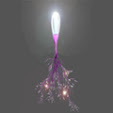The Scientific Search for the Soul
Francis Crick was one of the co-discoverers of the molecular structure of the genetic molecule, DNA. Crick served as an important theorist who helped guide the growth of molecular biology, the new science that makes it possible for modern medicine to understand and combat diseases such as AIDS. Crick later became a theorist for neurobiology and the study of the brain. In 1994, Crick published a book, The Astonishing Hypothesis: The Scientific Search for the Soul, which boldly announced to the public that the human soul is a subject of scientific investigation.
In his book, Crick presented an idea that has great potential to provoke wide-spread public discussion and opposition. Researchers are discovering mechanisms of brain function that may account for the human soul. Few researchers care to inform the public of the implications of such research for fear of offending those who believe in non-material or eternal souls.
Some observers nothing of value in Crick's book and conclude that it would only be astonished if someone would be willing to pay money to read the book. J. J. Hopfield (Science magazine, 4 February 1994) concluded that, "The book should be read by scientists for its eloquent attempt to put consciousness, which we so much equate with the essence of our humanity, into the realm of science." I am in agreement with Hopfield that Crick's book is a heroic attempt to wrest consciousness from the minds of philosophers and place it in the hands of scientists.
Crick's Astonishing Hypothesis is that, "a person's mental activities are entirely due to the behavior of nerve cells, glial cells, and the atoms, ions, and molecules that make them up and influence them." What Crick was saying in his book was that scientific study of the brain has brought us to the point that scientists can now accept consciousness, free will, and the human soul as subjects for scientific investigation.
There are many who feel threatened by the idea (to quote Crick) that, "You, your joys and your sorrows, your memories and your ambitions, your sense of personal identity and free will, are in fact no more than the behavior of a vast assembly of nerve cell and their associated molecules." Crick confronts these fears directly by using an unscientific word, soul. Crick is confrontational in his approach and challenges religious believers with the idea that there is a scientific view of the soul as being just one more manifestation of brain physiology.
Anyone with an interest in how their brain works should let Crick take them on a guided tour. In coming decades, science may reveal the mechanisms of mind and provide humans with powerful means to control their brains. Crick's book is an invitation to understand this brave new world.



0 Comments:
Post a Comment
<< Home